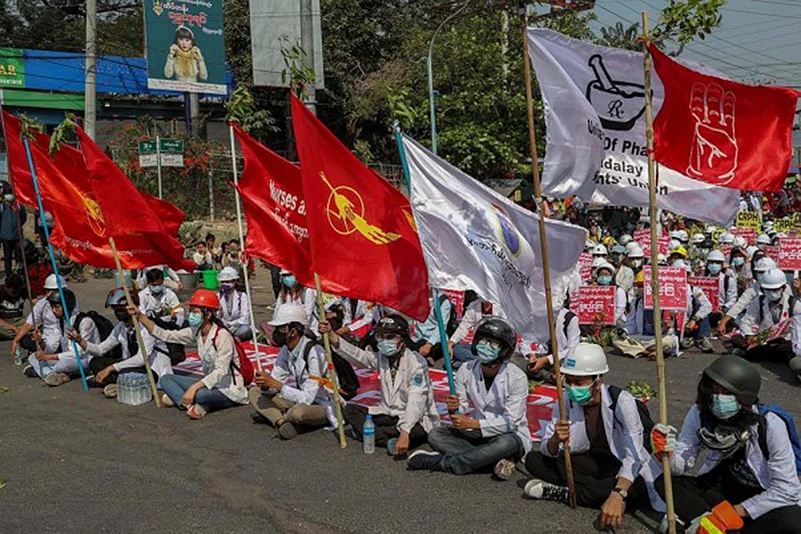The military coup in Myanmar poses several challenges for India as it adjoins its sensitive northeastern border states, which have witnessed several insurgencies and is a region wrapped up in identity politics. On the one hand as a democracy, New Delhi has joined the international community in calling out the military junta and asking for the restoration of civilian rule. But if India is batting for democracy, giving shelter to people fleeing the military crackdown and entering the bordering Indian states of Nagaland, Mizoram, Arunachal Pradesh and Manipur is a given. Yet on Friday the Union Home Ministry cautioned the state governments of the bordering states to keep a hawk's eye on the international border with Myanmar and ensure that refugees do not cross over to India.
Significantly on Friday the high-profile quad summit also took place. In the wide ranging conversation on the Indo-Pacific, Myanmar was on the table. In talks between the four leaders - Prime Minister Narendra Modi, US President Joe Biden, Japanese Prime Minister Yoshihide Suga and Australia’s Scott Morrison – the situation arising from the coup and the urgent need to get the military junta to free political prisoners-- including National League for Democracy (NLD) leaders like State Counsellor Aung San Suu Kyi and President Win Myint, as well as hundreds of protestors ---was discussed at length. All four leaders were on the same page on the need to restore civilian rule. Moreover the Biden Administration unlike the Trump White House is committed to promoting democracy world-wide. This has been articulated several times by senior officials of the new US administration.
Soon after the military crackdown in Myanmar, around 100 people crossed over to the Champai district of Mizoram. Among them were eight policemen and their families, who said they were asked to fire on innocent protestors and could not do so. According to local news reports the Myanmar government officials had asked their Indian counterparts to send back the eight policemen. But sending them back is unlikely as New Delhi attempts to balance its engagement with the military with its commitment to democracy. Political insecurity in Myanmar affects the on going peace process in many of the bordering states. In the past, northeastern insurgent groups often found shelter in Myanmar. Instability would help energise these outfits. After several decades violence in the northeast has come down and the region is relatively calm. Myanmar’s military had on several occasions helped to flush out these groups. Delhi certainly would not like a stand-off with the Myanmar military over the return of policemen. Nor can it give in to the demand for their return. Officials are hoping that military will not pay much heed to this incident in far away Chin province. This is perhaps why the Home ministry would rather ensure that more people, including policemen, don’t cross over to India.
In the past, India had to pay a heavy price for siding with the NLD and turning its back on the military rulers. After the arrest of Aung San Suu Kyi in 1989, thousands of her followers fled to India and were given a home. But the vacuum left in Myanmar by India’s retreat had led to China spreading its wings in Myanmar. In 1992, former Congress Prime Minister Narasimha Rao reversed New Delhi’s pro-democracy policy and began engaging with the Myanmar military. Since then, it had kept up its engagement with the military regime. After her release from house arrest, Aung San Suu Kyi, who spent a large part of her girlhood in India, openly criticised India for engaging with the military. But strategic considerations led to Delhi’s decision. So while the Modi government will continue to call for democracy in Myanmar, India will remain engaged with the military and prod it to do the right thing. On Friday, soon after the reports about the 100 people including four policemen entering Mizoram, the home ministry asked the Chief Secretaries of the four-border states to "sensitize all law enforcement and intelligence agencies for taking prompt steps in identifying the illegal migrants and initiate the deportation processes expeditiously and without delay."
Infiltration from bordering states is a sensitive issue in the north east. The BJP government of Prime Minister Narendra Modi has been tough on immigrants and won popular support in the region by siding with local communities threatened by the illegal influx mainly from Bangladesh. Much of this happened in the past but sentiments remain strong to this day. However in the case of the Burmese refugees, the position is slightly different, as many of the border people are from the same tribe and have relatives and friends living on either side. The late NSCN leader Khaplang was a Burmese Naga.
















